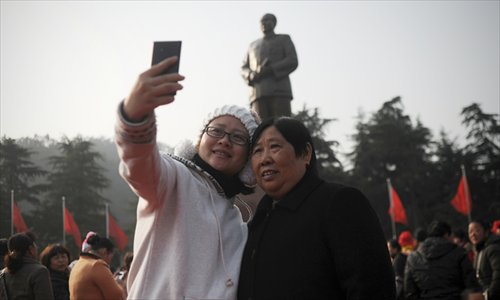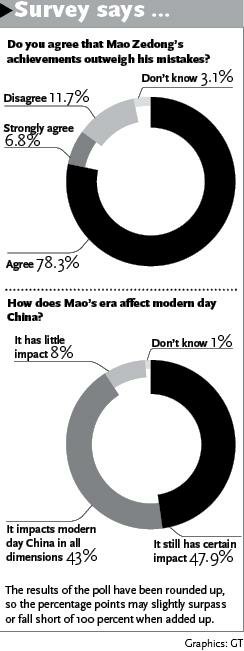85% say Mao's merits outweigh his faults: poll

Two Chinese women take a photo in front of a bronze statue of Chairman Mao Zedong in Shaoshan, Central China's Hunan Province on Tuesday. Thousands of Mao's admirers will come to Shaoshan, Mao's birthplace, this week to mark the 120th anniversary of the former leader's birth. Photo: AFP

Related Daily Special(s): Mao’s 120th anniversary marked with events nationwide
A Global Times poll has revealed that more than 85 percent of respondents see the merits of Mao Zedong as greatly outweighing his mistakes, with more than 90 percent of respondents showing reverence or respect to Mao.
The survey, conducted by the Global Times Global Poll Center through telephone interviews and online polls on Monday and Tuesday, interviewed 1,045 respondents aged over 18 in Beijing, Shanghai, Guangzhou, Chengdu, Xi'an, Changsha and Shenyang.
The findings showed respondents aged above 50 and those with a high school or vocational school education are more likely to revere Mao, while respondents who have a bachelor's degree or above are more likely to be critical of him.
In a multiple choice poll, nearly 90 percent of respondents believe the greatest merit of Mao, who was born 120 years ago on Thursday, is founding an independent nation through revolution, while nearly 60 percent admire him for advocating the idea of serving the people and spreading the notion of fairness.
"Fairness being the second most popular of Mao's merits makes sense as it's part of the reason that people miss the Mao era, because the wealth gap was not as big as now," said Zhao Zhikui, a research fellow at the Academy of Marxism under the Chinese Academy of Social Sciences, noting that it should be an alert to the authorities.
The poll also shows nearly half of respondents value Mao making China a nuclear power by making its own atomic and hydrogen bombs, as well as his promoting the liberation of women.
About 48 percent of respondents praised his deeds in paving the way for opening up the country through building Sino-US relations, nearly 55 percent voted for him promoting China's international position, and nearly 46 percent acknowledged his advancing the industrial and economic systems.
Nearly 80 percent of respondents believe Mao's main fault was launching the Cultural Revolution (1966-76), around 60 percent of them voted for his pushing the Great Leap Forward (1958-61) out of not respecting economic rules, and 46 percent mentioned Mao's main fault as launching a personality cult.
"The concern of those who hold a negative point of view toward Mao currently is that the acute social contradictions in today's China may lead to people rationalizing the Cultural Revolution and hoping to solve the problems through repeating the pattern," Huang Weiping, director of the Contemporary Chinese Politics Research Institute at Shenzhen University, told the Global Times.
"The authorities avoid deep discussions of the mistakes Mao made in launching the Cultural Revolution," he noted.
More than 90 percent of respondents believe that Mao's era still influences today's China. Those respondents aged from 18 to 29 were most likely to believe Mao's era still has an influence today, with figures of 96 percent.
Xie Chuntao, a professor with the Party School of the Communist Party of China Central Committee, told the Global Times that the survey shows Chinese society has a more rational attitude toward Mao and consider him as a politician from the perspective of his influence on the whole nation.
Zhao said the influence Mao had on China is obvious, as its political system, economic basis and international position is all rooted in the Mao era.
Activities such as galas, exhibitions and seminars are being held nationwide to commemorate the anniversary of his birth.
Local authorities in Mao Zedong's hometown in Shaoshan, Hunan Province, have spent billions of yuan on celebrations and public projects to mark the anniversary.